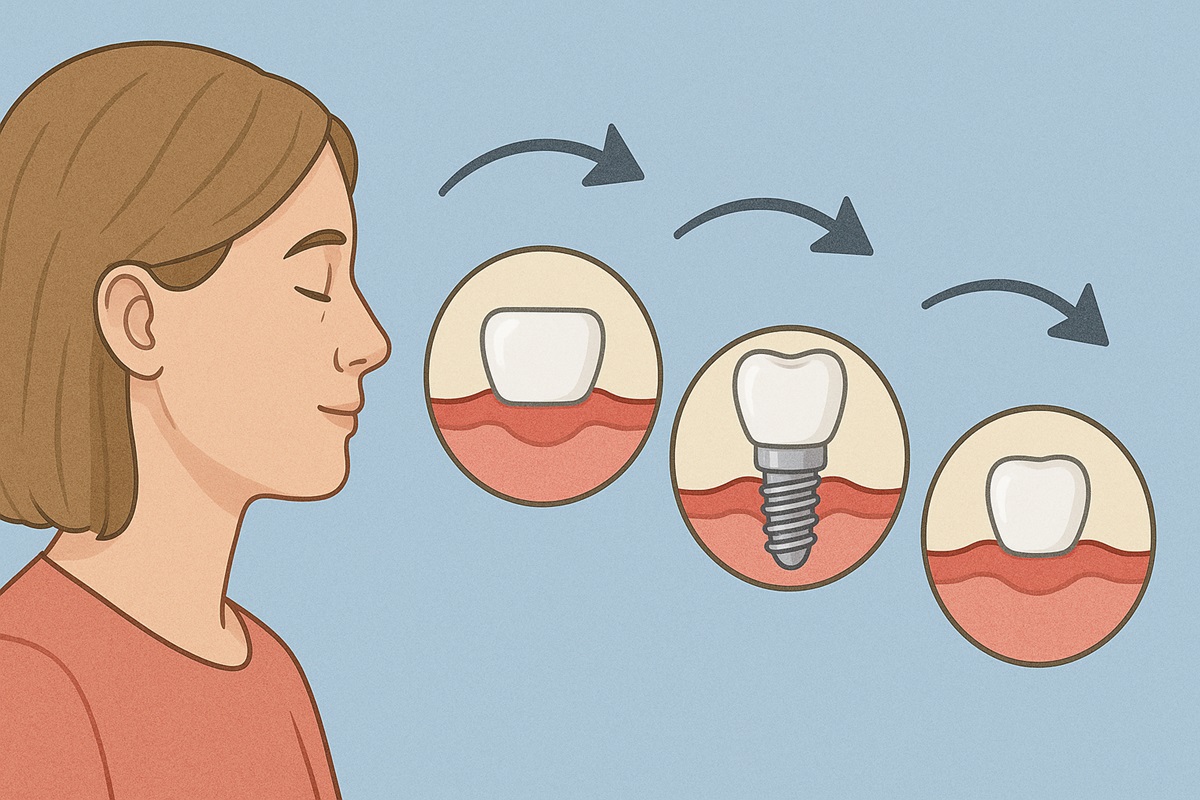Recovering after dental implant surgery is a common concern for many. Whether it is your first time or a follow-up procedure, feeling nervous or unsure is completely normal. At Rockville Dental Arts, we make it a priority to guide each patient through every stage with calm, clear, and honest advice. Healing is more than just waiting; it involves choices, attention, and care.
Understanding the dental implant recovery process helps ease worry and prepares patients for what’s ahead. With proper information and care, this healing phase can feel smoother and more manageable. At this point, trust plays a big role. Rockville Dental Implants are known for offering not only clinical care but also emotional support during recovery.
What Happens After the Surgery?
The body starts healing as soon as the implant is placed. This process involves bone bonding, tissue repair, and gradual restoration. During the early phase, it’s common to notice swelling, mild bleeding, or discomfort around the implant area. These signs are part of normal healing and tend to improve within a few days.
Healing time may vary depending on your overall health, bone strength, and oral habits. For most, recovery takes a few weeks, but deeper bone healing may continue for months. Patients often ask about returning to regular routines. Light activity can resume in a day or two, but heavy exercise should be avoided until advised.
Guidance From a Trusted Source
Having a reliable provider changes everything. A Dentist in Rockville MD, who understands your needs and personalizes your care plan can help shorten recovery and reduce risks. When patients follow specific post-operative instructions, they often heal faster and avoid common issues like infection or implant failure.
Our team focuses on regular follow-ups, personalized care tips, and open communication. This support helps catch concerns early and encourages the body to accept the implant. Infection control, proper hygiene, and dietary adjustments during healing contribute to successful results.
Pain Points During Recovery
Some discomfort is expected, but knowing what’s typical versus what requires a call to your provider is important. Here are a few concerns patients often mention:
- Swelling or bruising near the site that lasts more than a few days.
- Pain that intensifies instead of getting better.
- Numbness or tingling in the lips or jaw that does not fade.
- Bleeding that continues or worsens after two days.
When these signs are monitored and discussed with your dental team, they rarely become serious. The key is communication. Trusting the process and reporting symptoms early leads to smoother healing.
Tips to Improve Healing
There are practical ways to help the mouth recover more comfortably. These tips are designed to protect the implant and reduce inflammation:
- Use a cold compress to manage swelling in the first 24 to 48 hours.
- Stick to soft foods like soups, smoothies, mashed potatoes, and yogurt for the first few days.
- Avoid smoking as it delays healing and increases the risk of failure.
- Keep the area clean by gently rinsing with salt water after meals.
- Sleep with your head raised using an extra pillow to reduce fluid buildup.
- Avoid touching the implant site with your tongue or fingers.
All these actions support the dental implant recovery process and work together to create the right environment for bone fusion and gum healing.
Eating Right After Implant Surgery
Choosing the right foods matters more than most people think. After implant placement, hard, crunchy, or sticky items can disturb the site. The goal is to reduce pressure and allow proper integration.
Foods to enjoy include:
- Blended fruit or vegetable smoothies
- Lukewarm oatmeal or cream of wheat
- Soft scrambled eggs
- Mashed avocado or bananas
- Well-cooked pasta or rice
Staying hydrated helps too, but avoid using straws, which can dislodge blood clots and slow healing.
When to Resume Normal Activity
Most patients can return to work within two to three days. However, if your job involves physical exertion, more rest may be needed. Gradual return to daily tasks is best. Heavy lifting or bending should be limited until your provider confirms it’s safe.
Pain usually decreases within the first week. If discomfort continues or if chewing becomes painful, it is time for a follow-up. Every step in this phase needs careful observation to avoid complications.
Managing Expectations
Every mouth heals at its own speed. Some may recover fast, others more slowly. Bone health, gum condition, and hygiene habits influence outcomes. Expectations should be realistic, especially in multi-implant cases.
Patience is part of the healing plan. Our team always encourages realistic goals, steady progress, and timely check-ins. Emotional support is also key. When patients feel supported, the physical healing often goes better, too.
Long-Term Success and Maintenance
Even after the site feels normal, the implant still requires attention. Long-term success depends on:
- Regular brushing and flossing to prevent gum disease
- Routine dental visits to check stability and gum health
- Avoiding habits like teeth grinding or nail biting
- Staying informed about changes in your oral health
When patients remain active participants in their care, implants last longer. Small changes make a big difference.
Closing Thoughts
The healing after implant surgery is not just about waiting. It’s about choices, timing, care, and the support of professionals who listen. Rockville Dental Arts believes every patient deserves guidance, comfort, and results they can count on. Recovery may have its ups and downs, but with the right care, it leads to a restored smile.
To learn more or ask about your specific needs, contact us today. Book your consultation and take the first step toward healing with confidence.

